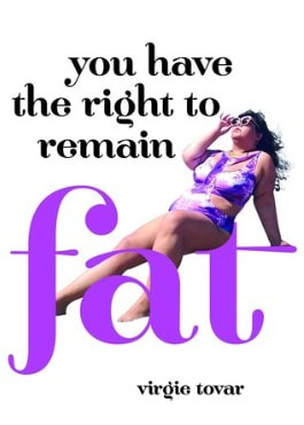|
The Breadcrumbs widget will appear here on the published site.
Why You Have The Right To Remain Fat is a Must-ReadYou Have The Right To Remain Fat by Virgie Tovar is a great introduction to fat liberation. I highly recommend this book to feminists, fat people, and anyone else who wants to understand fatphobia. Virgie Tovar is an author and fat activist from San Francisco, California. She’s one of the top experts on fat discrimination and body image. She also started the hashtag #LoseHateNotWeight. Tovar writes a fat column for Ravishly called Take The Cake. I enjoy her column, so I became curious about You Have The Right To Remain Fat when I first read about it. Needless to say, I’m glad I bought this book. It came into my life at the right time. It’s a short and satisfying read that really resonates with me. In this book, Tovar talks about her experiences with being a fat woman. She also talks about fatphobia and fat discrimination. Although fat people of all genders can read this book and relate, Tovar speaks from the perspective of a fat, cisgender, and straight woman. As a fat woman, I’ve experienced a lot of discrimination as well, so I found myself relating to a lot of her stories. For instance, she talks about being ridiculed on public transit and boys making fun of her for being fat - I’ve experienced both as well. This book gives a lot of insight into the abuse fat people experience at the wider culture. The fact that Tovar is Mexican and Iranian gives her perspective a unique and valuable lens. She makes it a point to delve deeply into the intersection between fatness and race. Fat POC are more marginalized than white fat people. Although I am discriminated against for being fat, I still have white privilege and this impacts how I’m treated. I find it both important and eye-opening to read about fatness from a fat POC’s perspective. This book is an enlightening read if you want to know more about the issues fat POC face. Tovar talks about why diet culture is toxic. She thinks food should be free from moral judgements and I couldn’t agree more. Diet culture moralizes food while enthroning thinness as a prize you can win if you try hard enough. The truth is not everyone has a body that’s capable of being thin. This book made me rethink my lifestyle. Recently, I’ve started trying to eat healthier (with less cholesterol, to be exact) and go to the gym 4 times a week. I’ve been enjoying the benefits of exercise, but I have to remind myself to exercise for reasons that aren’t rooted in thin supremacy. I do agree that food should be free from moralization. I agree that going to the gym doesn’t make you a better person. I am constantly struggling with embracing fat positivity while also exercising for my health. This book alone hasn’t given me a reason to abandon eating healthy and exercising. However, it did make me feel better about myself. It also validated a lot of my experiences with fatphobia and my opinion that fat discrimination is bigotry that should be stopped. By the time I was done with this book, I felt more empowered to not only be myself, but love my body. When you’re fat, loving your body is an act of rebellion. Tovar talks about how people saw her as less feminine and more masculine due to her size. As such, she was treated more like a guy and less like the “delicate flower” treatment other girls get. During Tovar’s childhood, when she and her friends would re-enact romances they’d seen in the media, Tovar was always cast as the man. I related a lot to Tovar’s experiences with being seen as “masculine” due to my size. I think being treated in a more masculine manner only reinforced my genderfluid identity. Tovar has me thinking about how fatness intersects with gender in a big way. For this, I’m eternally grateful. Tovar also discusses the differences between body positivity and fat liberation. Although both the body positivity and fat liberation movements have some overlapping principles, they are not the same thing. The differences she talks about are significant. For instance, fat liberation has the goal of gaining rights and liberty for fat people while body positivity has no set agenda other than being positive about different bodies. These bodies are often thin and white, not fat and brown like Tovar’s body. I appreciate how Tovar’s perspective on fat liberation vs. body positivity points out how body positivity isn’t helping fat people as much as it could. You Have The Right To Remain Fat is a must-read for anyone who’s interested in learning about how fatness intersects with different identities such as race, gender, sexual orientation, and class. Plus, this book is easy to read and the language isn't too academic. Tovar is good at making complex concepts very understandable and accessible with her writing. You can find buy this book on Amazon. CommentsComments are closed.
|
|








